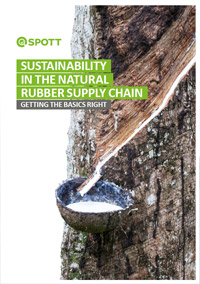Downstream companies and financial institutions hold the key to driving significant environmental and social changes in the natural rubber industry by committing to and applying sustainable practices and improving sourcing procedures.
Natural rubber is extensively used worldwide for everyday products such as tyres, shoes, footballs, condoms, gloves, sponges, roads, and balloons. On average, the annual consumption of rubber per person is estimated at 3.5 kg.
While natural rubber production can have significant environmental and social impacts, it can be grown sustainably, providing a livelihood for millions of people. Natural rubber production has been under the radar for many years in terms of its impacts, with other commodities such as palm oil and soy historically under more pressure to improve practices. But this is starting to change with the formation of the Global Platform for Sustainable Natural Rubber (GPSNR) and an increasing number of companies committing to producing and sourcing sustainable natural rubber.
This report contributes to this sustainability movement in the natural rubber supply chain by providing key findings of the analysis on data from the 2021 SPOTT assessments of 15 natural rubber producers and processors, looking at key environmental and social issues.
ZSL urges increased company disclosure of sustainability information on operations, policies, and practices. This includes companies adopting sound and robust Environment Management Systems, best practices of human rights and labour rights, good agricultural practices, NDPE policies, improving transparency and traceability in their supply chain, disclosing, and regularly reporting progress on implementation of their sustainability policies. Using the list of key SPOTT indicators (see section 6 in the report) can be an effective starting point.

